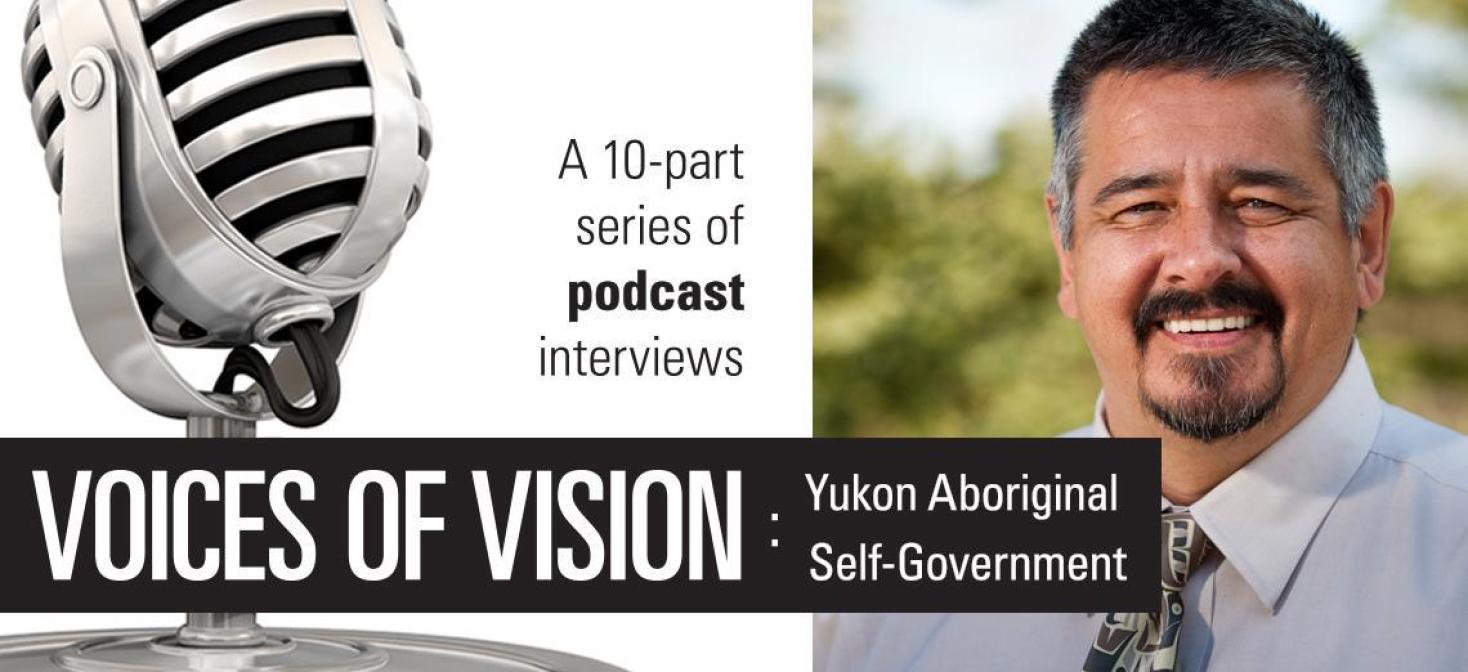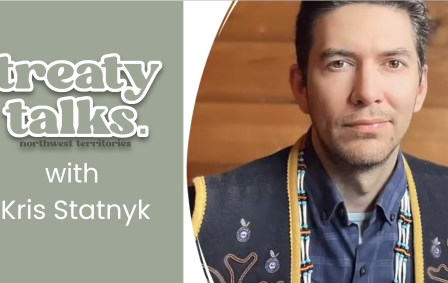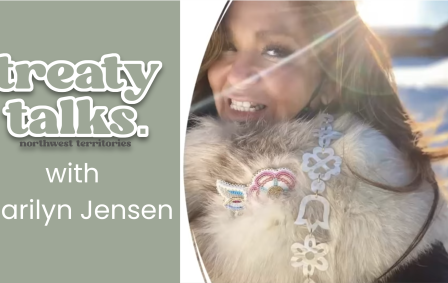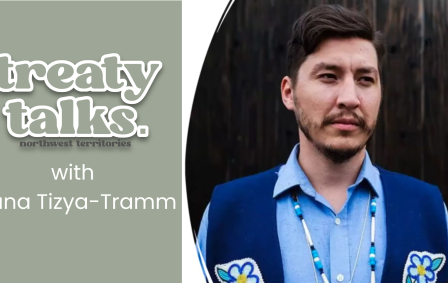Voices of Vision: An interview with John Burdek

John Burdek has long been a familiar face at many levels of government in the Yukon. Burdek, who was born in Dawson City, attended Lethbridge Community College and spent many years with the Department of Fisheries and Oceans Canada. He served as chairperson of the Ta'an Kwäch'än Council, the First Nation of which he is a member, leading its transition from an Indian Act band to a self-governing First Nation. His vast array of experience also includes work with Yukon College, Aboriginal Affairs and Northern Development Canada and his current role with the Government of Yukon's Governance Liaison and Capacity Development Branch. Burdek was a signatory to both the Final and Self-Government Agreements of the Ta'an Kwäch'än Council.
Consult the glossary of terms used in the Voices of Vision podcasts.
Back to Voices of Vision podcast series
Transcription
00:00:00
MEAGAN PERRY: What do you think that self-government brings to Yukoners?
JOHN BURDEK: Well I'm not sure what it brings for all Yukoners but for me I really see this as the opportunity to move forward.
MEAGAN PERRY (VOICE OVER): That is the voice of John Burdek, former Chairperson of the Ta'an Kwach'an Council.
JOHN BURDEK: You know when we signed our agreements after we'd ratified with Ta'an and we had, you know, a group of leaders and Elders out at Lake Laberge in our Lake Laberge office where we voted and passed the piece. And when I was driving back in with a couple of Elders there, they're telling me stories about all kinds of, you know, challenges that they've had in the past and not so fun times and a few little fun times. And then, you know, before we kept driving into Whitehorse and then they were talking about their kids and then their grandkids and the opportunities. So, you know, you could really see that this was a big opportunity to work through those challenges and issues that we've had in the past and really a framework to move forward as First Nation people within the Yukon.
MEAGAN PERRY (VOICE OVER): Burdek has taken an active role in making Yukon's modern version of aboriginal self-government come to life. As a negotiator, a First Nations leader, and through his work with the federal and territorial governments, Burdek has worked to make the vision laid out in 1902 by Chief Jim Boss, and then in the mid '70s by leaders like Elijah Smith, come to fruition in the Yukon. In February of 2011 John Burdek met with me in his Whitehorse office to talk about the way aboriginal self-government is creating a new political and social reality in the Yukon. I'm Meagan Perry, and as we began our conversation I asked him about the Ta'an Kwach'an Council.
JOHN BURDEK: Our First Nation is the Ta'an Kwach'an Council. It's a little First Nation located just outside of Whitehorse, but the centre of it – our initial reserve – is in Lake Laberge. We were combined by Indian and Northern Affairs back in the '50s with the Whitehorse First Nation and we became the Whitehorse Indian Band. But through the land claims process both Kwanlin Dün and Ta'an then separated to become their own historic entities again. And so our cultural centre is at Lake Laberge, and then we've got a lot of areas and overlap with Kwanlin Dün here in Whitehorse.
MEAGAN PERRY: Tell me about how you became involved in working towards self-government and land claims agreements and implementation. Is there a personal connection to that work for you?
00:02:24
JOHN BURDEK: Well I think when I went over to Ta'an as the Chairperson – that position was called Chairperson; now they call it Chief – but that was kind of trial by fire. Basically we were finalising our separation – our official separation from Kwanlin Dün. We needed to do that to finalise our land claims agreements and self-government agreements. So that was the term that I came into as Chair. So you become very familiar very quickly with the whole process.
MEAGAN PERRY: Sounds stressful.
JOHN BURDEK: Well it was intense, that's for sure – and a lot going on. But pretty exciting – pretty exciting times. You don't often get a chance to do work like that, you know, in terms of forming governments.
MEAGAN PERRY: And what did you hear from older people in the community at the time? It seems like such a big shift.
JOHN BURDEK: Well at that point in the process – there's always a mix of folks. You know, some people were getting quite frustrated with the lack of process on the separation from Kwanlin. It was stuck on a few items. Others were getting, you know, frustrated because the length of the whole negotiation process – you know, 30-something years. It's hard to stay focused and engaged with that. And then there are others that really looked to the future and really keep you motivated because they can – they know this is tough work and it may be frustrating but in the long run, the long range, and long term it's going to be a real benefit to the people.
MEAGAN PERRY: And what – for you, what was it that sparked your interest in doing that work?
JOHN BURDEK: Well it was probably quite a number of factors, but I really wanted to get involved with my First Nation and work directly within the First Nation. So that was certainly the opportunity to take on the position of Chair allowed. So that was great.
MEAGAN PERRY: And how old were you when you did that?
00:04:26
JOHN BURDEK: Oh, it seems like 100 years ago. But probably, oh, in my 40s I guess.
MEAGAN PERRY: OK. Now self-government – achieving self-government is a process that requires, as you said, a longterm commitment – it's taking a long time – and participation from all the parties involved. Now you've been involved at all levels of government in the territory. Is that right?
JOHN BURDEK: Well I haven't worked for the City of Whitehorse yet, my wife points out, but I have worked at, you know, fairly senior levels within the federal government, Indian Northern Affairs and Fisheries and Oceans, and, you know, currently working with the Yukon Government. I led Ta'an First Nation as Chair and did a term on the senior management team with Yukon College as well. So I certainly got to sort of view the process from a number of different positions around the table.
MEAGAN PERRY: And so looking at that, what do you think makes it successful?
JOHN BURDEK: Well again that's the measure of successful – again, really that it's – these modern-day governments are fairly new in terms of government so in some areas we're really seeing some success and some progress but in other areas we are seeing, yeah, some areas that are a bit challenging. So – and different approaches and different understandings and level of understandings of what self-government is amongst the different governments that I've been involved with as well.
MEAGAN PERRY: Just over half of all the self-government agreements in Canada are in the Yukon. Why do you think it works in the Yukon?
JOHN BURDEK: Well, yeah, I think it's more than half that we have. I mean there's self-government arrangements but I don't think there's any self-government agreements out there that are as comprehensive as the Yukon ones. And I think the opportunity here was for a number of factors – you know, certainly the historic lack of any treaty process in this area, the amount of control the federal government had over land and resources allowed them more flexibility to work with First Nations. And I think the First Nation folks that were involved through this whole process were very visionary and really could see the future and the potential opportunity of this process back in the '70s. It's just amazing. And you read that book – and I do every once in a while – Together Today for our Children Tomorrow. And it's still so relevant. And it still touches on all the key challenges. I mean the language is sort of outdated but the whole – you know – the whole vision within that document is still as alive today.
MEAGAN PERRY: What do you think when you look back on the years you've worked to develop self-government in the Yukon?
00:07:18
JOHN BURDEK: Well it certainly hasn't been as long as a bunch of folks that have been involved, you know. I really got involved in the process when I became Chair of Ta'an, and a lot of that wasn't necessarily with the actual negotiation process. Most of my experience has been, you know, with the implementation of it to try and bring these agreements, these jurisdictions of what has been able to be achieved here, bring them to life, put them into practice. And so, I mean the really interesting thing is it's two very different processes that – you know, the whole negotiation process and then the implementation process. And I think that's probably, from my experience, some of the challenges that the public governments are facing is that they haven't been able to make that transition very well or at all between their – you know, the negotiation process and then moving in to implementation. So that's a big challenge for us.
MEAGAN PERRY: Was there ever a time in the course of your work when you felt that self-government had made a breakthrough – you know, when you could see self-government having a positive effect in the lives of Yukoners?
JOHN BURDEK: Well I don't know if I've seen sort of one “a-ha” moment. I think it's – it's just more incremental. And you have to step back and have a look at, you know, over a period of time. So if we're just looking day to day for something, it's difficult to pinpoint anything. But I think if you step back and compare – compare ourselves to, well, you know, what was it like to be a First Nation person on the streets of Whitehorse 25 years ago as compared to today? Huge significant difference. You know, what were the education levels? How have they moved forward in the time that we've had? How about the – just the gap that we've had in employment opportunities and involvement in the decision-making process as First Nation people? So in the last 20, 25 years that's changed significantly. And that may or may not all be attributed to self-government, but I think it has a significant impact on that process.
MEAGAN PERRY: Sometimes it's difficult for younger people to recognise the changes that self-government has brought to their lives. Can you think of a concrete example of the day-to-day benefits of self-government?
00:09:42
JOHN BURDEK: Education, right off the bat. And again it relates to the ability and the authority of self-governing First Nations to set their own priorities. So if we use education, for example, in the past funding for post-secondary education has flowed from Indian and Northern Affairs. It's a set amount. You could spend it on degree programming for – within your First Nation. And that's all you had available and that's all you could spend within there. A self-governing First Nation can determine – and there has been a number that have – that, you know, education is a key priority for us. We need to invest in education. So they can channel and determine an investment in education. They could say: we're going to spend $500,000 on education for the next five years. And folks who are citizens who want to pursue post-secondary education, we're going to support them. Not only for university degrees but if they're pursuing diplomas or certificates, if they're pursuing certification in the trades, we're going to support all that. So that's a huge difference in how an Indian Act Band vs. a self-governing First Nation can support the citizens for post-secondary education.
MEAGAN PERRY: And do you see a lot of people taking those opportunities to take other kinds of training?
JOHN BURDEK: Oh yeah. Even within our small First Nation we've revised the education – post-secondary education policy to include the diploma and the trades, and very much seeing more people being able to then pursue that because they have some additional support from the First Nation. It's great, you know, and I think we're going to – in the short term, you know, we don't see much of the benefits. But if we look down the road five or 10 years it's going to have a significant impact for this upfront investment in the education of our citizens.
MEAGAN PERRY: For Yukon citizens understanding the Umbrella Final Agreement and the First Nations final agreements and the self-government agreements and land claims agreements, it's important – what's the plain – but they're big documents – what's the plain language explanation that you give to any Yukoner who might not know much about those agreements?
JOHN BURDEK: Well, you're right. They are huge agreements and written by lawyers. And unless you've worked directly with them in the negotiating team, most folks aren't all that familiar with them. And why would they be, unless you're working with the day-to-day. So the huge challenge is to try – you know, try and make people aware of what's within those agreements. And I think that needs to be an ongoing process. I think that's an area that we really – all governments really need to focus on and really talk about some of the important elements that are within the agreements, especially, you know, the legal jurisdictions for self-governing First Nations to pass laws and control different activities, to manage their own affairs, to make decisions and prioritise their areas of priority, you know, in terms of not having to deliver or re-deliver programs that come down through the other governments as has been the process in the past, but be able to look at, you know, we want to take X number of hundred thousand dollars and invest it in education or invest it in housing, and as a government that's a structure that's been put in place to allow them to do that. So very much when you talk about self determination, these documents really allow the framework and the structure for that.
MEAGAN PERRY: Now the Yukon model as we've been talking about, it's unique in the world and very different from First Nations agreements in southern Canada, as you pointed out. How do you explain Yukon First Nations self-government to First Nations people in other parts of Canada?
00:13:31
JOHN BURDEK: Well, it's – because they're huge and by their nature they're comprehensive land claim agreements so they're difficult to summarize, but I think the best analogy that I can come up with is that self-governing First Nations are very much comparable to the structure of provincial or territorial governments. So they have jurisdiction and jurisdictional authority to pass their own laws, to manage their own affairs. They have taxation authority, which is much different than Indian ActBands. They have the ability – the self-governing First Nations have the ability again to prioritize where and how they spend their money based on, you know, their community needs. So you don't necessarily have to work within the parameters of a program that's being funded by Indian and Northern Affairs or the territorial government and you can only spend it in that area. If you decide to invest in housing or in education, you can do that and set your own parameters around that.
MEAGAN PERRY: What kind of reaction do you get when you talk to people down south about these agreements?
JOHN BURDEK: Well, it – you know, because folks are so used to the Indian Act process and that's their level of understanding – and I mean that's human nature. There's, you know, 600 and something Indian Act Bands in Canada and very few self-governing First Nations. So everybody's experience and understanding of First Nations is through the Indian Actcontext and with the Indian Act lenses on. So if up front you are able to demonstrate some of the fundamental structural differences between self-government and Indian Act Bands, then folks can look at it through a different set of lenses. And then you can build on the understanding there. But often times when you're trying to describe to folks – and not just other First Nations in other parts of the country but, you know, governments in other provinces or in Ottawa, you know they're very much trying to interpret everything you're trying to describe as self-governing as through an Indian Act filter. And that's the challenge, is to show where it's different – fundamentally different as far as those actual accountabilities and responsibilities in jurisdictional transfers that are very similar and even paramount in a lot of cases to provincial and territorial authorities.
MEAGAN PERRY: Right. It's the challenge of building something new, hey?
00:16:11
JOHN BURDEK: Well, and the excitement as well. I mean it's – sometimes because self-governing agreements – there's 11 in the Yukon and 680 Indian Act Bands out there – they're very unique. And that's the real huge challenge, is the governments – particularly the federal government that's so used to and all their processes are used to dealing in the Indian Act circumstance with reserves and those different authorities, there hasn't been that adjustment within their system to actually be able to engage and work with self-governing First Nations in terms of the agreements that are in place.
MEAGAN PERRY: Do you have any predictions about how governments will overcome the challenges that come with building something new like that?
JOHN BURDEK: There's no crystal ball. And it's difficult. You know, we see that every day and for a number of different factors. But it is a new way of doing business. There is new jurisdictions. It's like establishing, you know, new provinces within Canada. We have to learn how to recognize those within the national framework and then as well as within the provincial and territorial framework as well of where these governments fit in and how they fit in. So, you know, the biggest challenge to work through is for other governments to be making those adjustments to their legislation, their processes to reflect what's been agreed to within the self-governing agreements. And one of the misconceptions that I've experienced that are out there is that, you know, these self-government agreements, oh these are First Nations agreements. These aren't First Nation agreements. The agreements in the Yukon are tri-lateral agreements between the federal government, territorial government, and the particular First Nation. And what's outlined within those agreements is how we're now going to do business in the Yukon. So this is the process that we are going to use to manage wildlife with the Fish and Wildlife Management Board, you know, with the different renewable resource councils. All the parties have agreed this is now how we're going to do business in the Yukon. So they're not just First Nation agreements. They're basically agreements of a governance within the Yukon and how we're going to do that. And that's – you know, when you talk to people about that you kind of see the gears going around. Well that's a different way of looking at things. But to me that's the reality of what these agreements bring.
MEAGAN PERRY: As you said, it's not possible to implement all these agreements in a flash. With your experience in land claims and self-government what do you see as the priority items when it comes to implementation of the agreements?
00:18:49
JOHN BURDEK: From a First Nation perspective I think to develop and establish the whole governance structure within this new governance landscape that we call self-government. There is a lot of government processes that are required to run a government that you didn't have to have in place as an Indian Act Band. So establishing those to suit, you know, your values, the culture, but as well to engage and operate in a modern-day world as well is a big challenge. And a lot of that is just, you know, it's not sexy. It's just kind of the whole process around organizational operations that governments just have, whether you're a First Nation government or a territorial government or, you know, a government from the States or a government in Africa. You still need those structural mechanisms to operate as a government. So that's a big challenge, is to get those within the limited resources that First Nations have within self-government. But that then very much drives your ability to really sort of exercise the promise of opportunity within the agreements.
MEAGAN PERRY: Yukon First Nations have a long history of commitment to land claims. What does it feel like for you to be part of that history?
JOHN BURDEK: Well I certainly haven't been involved as long as some folks have, but to be a small part of it, to relate the process – like with Ta'an I mean it was Chief Jim Boss in 1902 that was first recognizing and talking to government to say hey, you know, we need to do something here. This is having a huge impact on us, which really started the historical context here in the Yukon for that process and then with Elijah Smith and folks reinvigorating that in the '70s, you know, related to some court cases. And so the number of folks that have been involved in that, it's pretty humbling to see and be a small part of that. And – you know, and there is a bit of idealism associated with it because you do – you know, it is working for the people, it is trying to create a framework or a better opportunity for folks as we move forward. So it's very challenging but it's also pretty exciting, pretty rewarding as well.
MEAGAN PERRY: Thanks for talking to me today.
JOHN BURDEK: You're welcome.
MEAGAN PERRY (VOICE OVER): That was John Burdek. The content of this interview is intended to deepen public understanding of the history of land claims and self-government implementation in the Yukon, and represents the opinions and ideas of the interviewee alone. This series of podcasts was produced by the Implementation Working Group, a cooperation between the Council of Yukon First Nations, Government of Yukon, Government of Canada, and Self-Governing Yukon First Nations.


